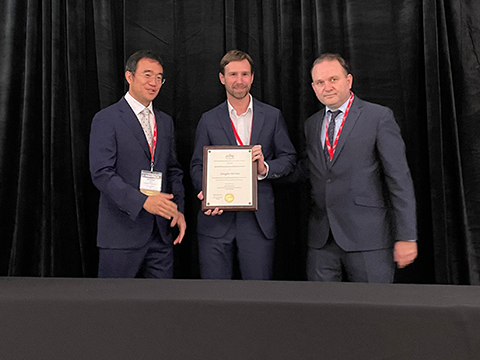Douglas DeVoto Earns ASME Excellence in Mechanics Award
Focus on Failure Leads to Commercial Success for Clean-Energy Power Electronics

Douglas DeVoto has been awarded the Excellence in Mechanics Award by the Electronic and Photonic Packaging Division of the American Society of Mechanical Engineers (ASME). Photo by Werner Slocum, NREL
Most people are not interested in failure—quite the opposite, actually. But for Douglas DeVoto, who leads reliability and prognostics research for automotive power electronics within NREL’s power electronics and electric machines group, failure is the most fascinating part.
Since joining NREL in 2010, DeVoto has focused on how and why power electronics fail and what researchers can do to boost their performance and extend their lives. That work, his colleagues say, has been transformative for the power electronics field, which focuses on creating devices that “switch” power from one form to another for vehicles, the electrical grid, and other clean-energy applications.
Now, in recognition of his outstanding accomplishments, DeVoto has been awarded the Excellence in Mechanics Award by the Electronic and Photonic Packaging Division of the American Society of Mechanical Engineers (ASME).
The recognition, granted to a single individual each year, honors DeVoto’s body of work in accelerated testing, failure evaluation, and system reliability modeling for electric-drive vehicles, including electric cars and airplanes. He has collaborated with more than 50 universities, research institutions, and national laboratories on projects totaling more than $30 million in funding.
Currently, DeVoto is leading two prestigious, highly experimental projects funded through the Advanced Research Projects Agency–Energy (ARPA-E) to develop the future of power electronics packaging: one to develop a new concept for flexible, scalable, medium-voltage substations that can be embedded in a compact underground vault and one to revolutionize the performance, lifetime, and form factor of additively manufactured power modules for an array of clean-energy technologies. By allowing for accelerated adoption of renewable energy technologies, electrified transportation, and upgraded electrical systems, both of these projects are on track to help make an electric future more possible.
The through-line of DeVoto’s career has been an effort to develop power modules with transformational improvements that make them more reliable, resilient, power-dense, and easy to manufacture. This, said Sreekant Narumanchi, who leads NREL’s Advanced Power Electronics and Electric Machines (APEEM) group, has pushed the research communities to which DeVoto contributes to new heights.
“The foundation for Doug’s work is his strong technical acumen and his aptitude for experimental and modeling activities. These skills have allowed him to shape many compelling, cutting-edge projects,” Narumanchi said. “He is an innovative thought leader in addition to leading the APEEM group’s research in thermo-mechanical reliability, physics of failure, and advanced packaging. Through these activities, and thanks to his collaborative nature, Doug has had a significant imprint on both the power electronics packaging and reliability communities. I am very pleased to see Doug’s leadership and contributions recognized through this prestigious award by the ASME.”
For DeVoto, a driving force of his work is the balance between the challenge and reward of experimental research, especially when it stops being experimental and moves into a real-world application.

DeVoto was formally presented with the ASME Electronic and Photonic Packaging Division Excellence in Mechanics Award at the 2023 ASME InterPACK conference in San Diego, California. Photo from Sreekant Narumanchi, NREL
“When we partner with industry, there’s a significant risk if a novel clean-energy technology commercially fails due to lower than predicted reliability,” DeVoto said. “If our reliability work doesn’t capture the key failure mechanisms or incorrectly calculates the lifetime of a component before a technology is commercialized, it can create an unexpected failure in the product. That can create a dim view of the technology. A consumer who experiences this firsthand will be hesitant to make another purchase in the future, and it could lead adoption of the clean-energy technology to slow.”
In response, DeVoto likes to balance the feedback between real-life experimental evaluation with modeling. By balancing a materials, science-based understanding of what happens within a package with an understanding of how the package interacts with its environment, he said, researchers can have a truer understanding of why products might fail in the real world—and learn how to mitigate that risk.
“It’s rewarding to develop this deeper understanding of how a component or system operates,” DeVoto said. “And it’s also very challenging. This kind of high-risk, high-reward work—especially what we do with ARPA-E—keeps the research exciting.”
That research has real impact. DeVoto’s work on the reliability of power electronics, electric drive systems, and thermal materials has been commercialized and adopted by industry partners, including General Motors, General Electric, Wolfspeed, and DuPont. He has filed several records of invention and patents. And together with the APEEM group, he was a recipient of an R&D 100 award, also known as the “Oscars of Innovation,” for a silicon carbide inverter that can improve performance for both hybrid and all-electric vehicles.
Failure might be DeVoto’s focus. But it certainly is not his fate. One successful project after another, he is helping to break the most challenging technical barriers to widespread adoption of clean-energy technologies—helping to make an electrified future possible for all.
Learn more about NREL's sustainable transportation and mobility research and its specific focus on power electronics. And sign up for NREL's quarterly transportation and mobility research newsletter, Sustainable Mobility Matters, to stay current on the latest news.
Last Updated May 28, 2025
